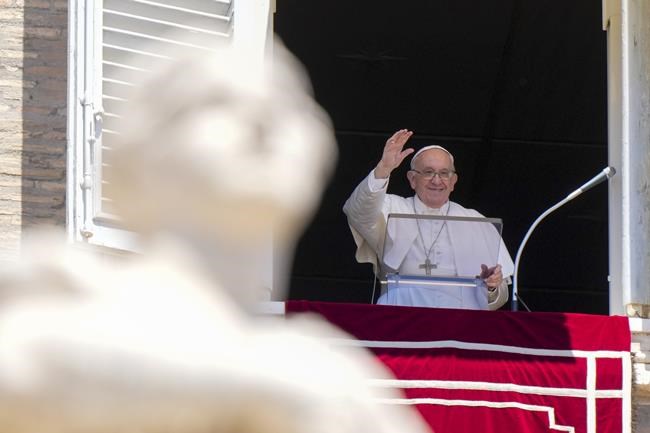Pope says traditionalist Catholics “gag” church reforms
Advertisement
Read this article for free:
or
Already have an account? Log in here »
To continue reading, please subscribe:
Monthly Digital Subscription
$0 for the first 4 weeks*
- Enjoy unlimited reading on winnipegfreepress.com
- Read the E-Edition, our digital replica newspaper
- Access News Break, our award-winning app
- Play interactive puzzles
*No charge for 4 weeks then price increases to the regular rate of $19.00 plus GST every four weeks. Offer available to new and qualified returning subscribers only. Cancel any time.
Monthly Digital Subscription
$4.75/week*
- Enjoy unlimited reading on winnipegfreepress.com
- Read the E-Edition, our digital replica newspaper
- Access News Break, our award-winning app
- Play interactive puzzles
*Billed as $19 plus GST every four weeks. Cancel any time.
To continue reading, please subscribe:
Add Free Press access to your Brandon Sun subscription for only an additional
$1 for the first 4 weeks*
*Your next subscription payment will increase by $1.00 and you will be charged $16.99 plus GST for four weeks. After four weeks, your payment will increase to $23.99 plus GST every four weeks.
Read unlimited articles for free today:
or
Already have an account? Log in here »
Hey there, time traveller!
This article was published 14/06/2022 (1276 days ago), so information in it may no longer be current.
ROME (AP) — Pope Francis has complained that traditionalist Catholics, particularly in the United States, are “gagging” the church’s modernizing reforms and insisted that there was no turning back.
Francis told a gathering of Jesuit editors in comments published Tuesday that he was convinced that some Catholics simply have never accepted the Second Vatican Council, the meetings of the 1960s that led to Mass being celebrated in the vernacular rather than Latin and revolutionized the church’s relations with people of other faiths, among other things.
“The number of groups of ‘restorers’ – for example, in the United States there are many – is significant,” Francis told the editors, according to excerpts published by the Jesuit journal La Civilta Cattolica.

“Restorationism has come to gag the council,” he said, adding that he knew some priests for whom the 16th century Council of Trent was more memorable than the 20th century Vatican II.
Traditionalists have become some of Francis’ fiercest critics, accusing him of heresy for his opening to divorced and civilly remarried Catholics, outreach to gay Catholics and other reforms. Francis has taken an increasingly hard line against them, re-imposing restrictions on celebrating the old Latin Mass and taking specific action in dioceses and religious orders where traditionalists have resisted his reforms.
Just last week, in a meeting with Sicilian clergy, Francis told the priests that it wasn’t always appropriate to use “grandma’s lace” in their vestments and to update their liturgical garb to be in touch with current times and follow in the spirit of Vatican II.
“It is also true that it takes a century for a council to take root. We still have forty years to make it take root, then!” he told the editors.
Speaking about the church in Germany, Francis also warned that he still had an offer of resignation in hand for the archbishop of Cologne, Cardinal Rainer Maria Woelki, who faced strong criticism for his handling of the church’s sexual abuse scandal.
Francis gave Woelki a “time out” of several months last September, but still hasn’t definitively ruled on his future. That has kept the situation in Cologne uncertain and frustrated the head of the German bishops’ conference, who has pressed for a decision one way or the other.
“When the situation was very turbulent, I asked the archbishop to go away for six months, so that things would calm down and I could see clearly,” Francis said. “When he came back, I asked him to write a resignation letter. He did and gave it to me. And he wrote an apology letter to the diocese. I left him in his place to see what would happen, but I have his resignation in hand.”
The Free Press acknowledges the financial support it receives from members of the city’s faith community, which makes our coverage of religion possible.


